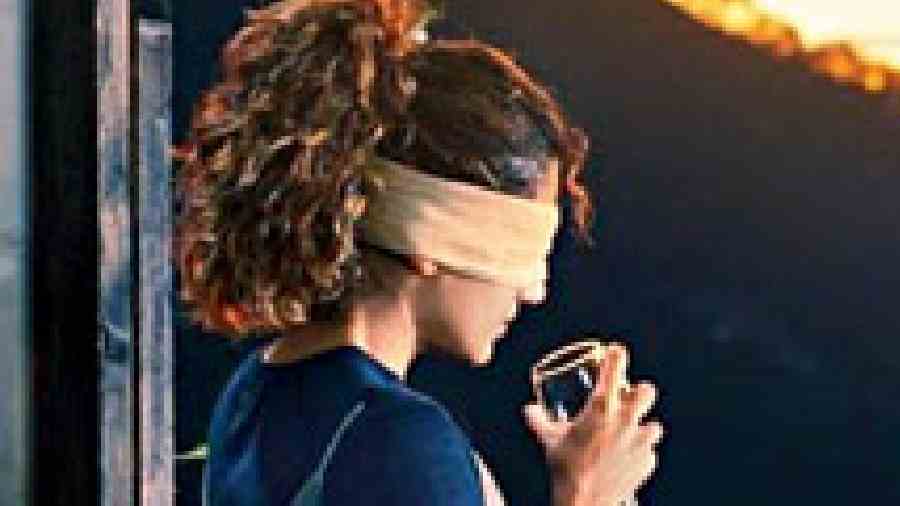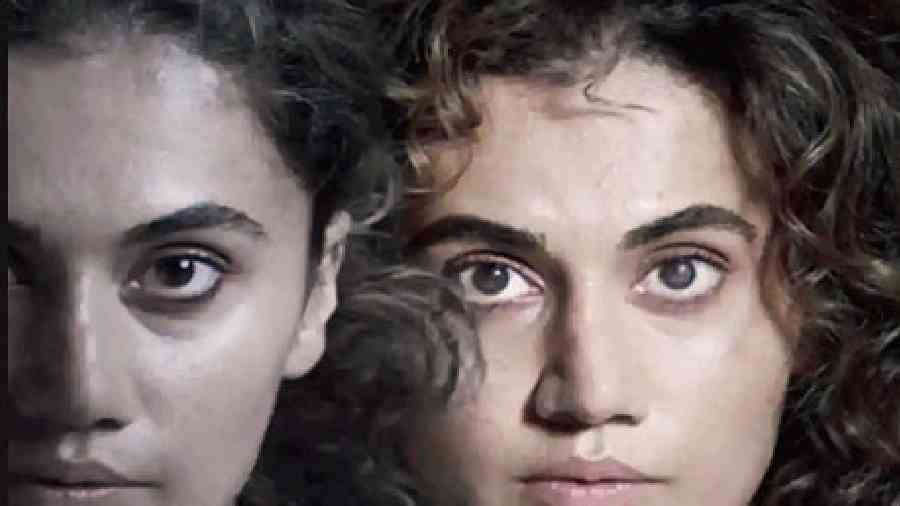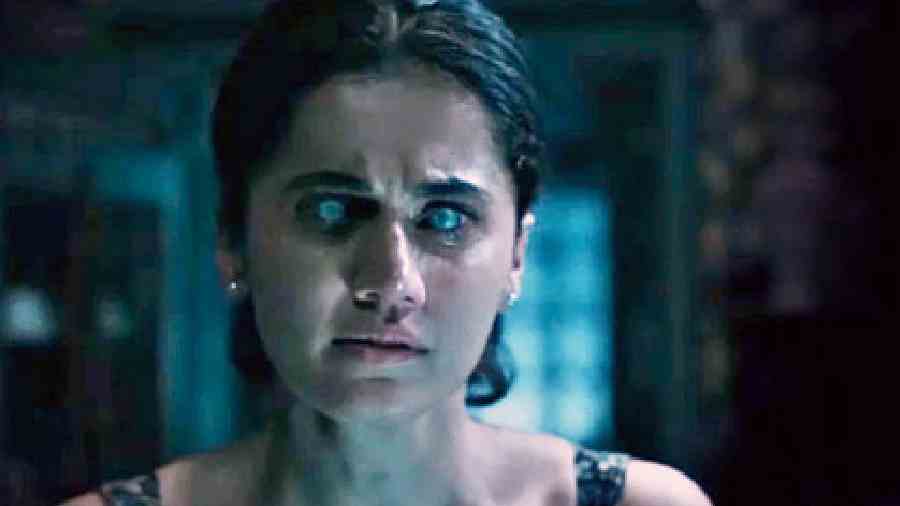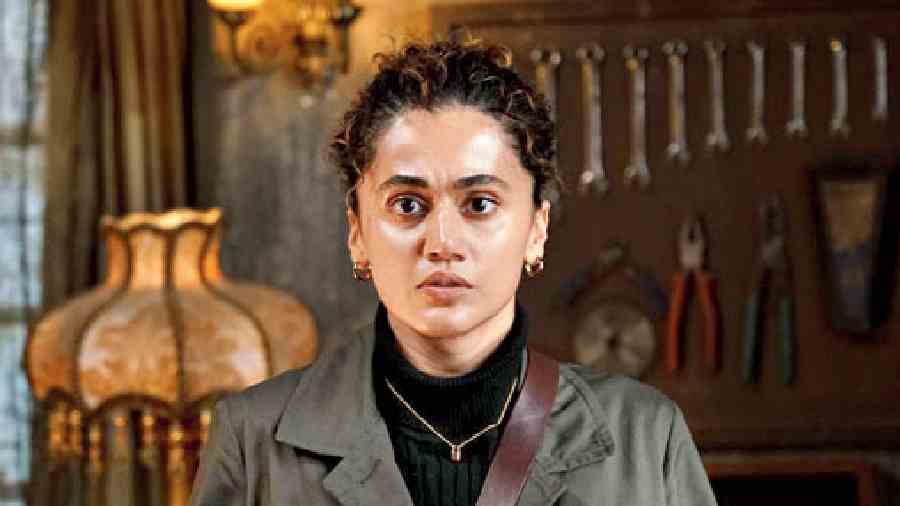Taapsee Pannu squeals on hearing that I had left watching Blurr midway to conduct the interview. “Arrey, don’t do that! You missed the most thrilling part. The last 30 minutes are mind-wrecking!” Conversation ensues on her latest film, streaming on Zee5, a horror thriller where she probes the death of her visually challenged twin sister while gradually losing her own vision.
Blurr is your first film as producer. What made you turn one?
I always planned to turn producer but this film did not feature in the plan. Two months after signing the film I realised I needed a bit more than just being an actor. I wanted the film to be made in and look a certain way. As an actor, you can’t really command a lot of things. So I decided to step in as a co-producer so I could actually ask for things beyond acting — right from casting to the technical departments or how the film needs to look... I asked Vishal (Rana, the producer) who had the script, to let me come on board. Once that happened, I asked him if we could ask Ajay (Bahl) sir to direct it. I had seen his Section 375 and had messaged him saying I wanted to work with him.
This is a remake of the Spanish film Julia’s Eyes. Did you watch the original?
I had seen it in 2018 when I was doing Badla, which was based on another film (The Invisible Ghost) written by him (Oriol Paulo). I was so blown away by his writing that I watched everything he had written. So when this came my way, I did not need any description and said yes.
What kind of changes were made for the Indian adaptation?
Sometimes European thrillers are too cold for Indian audiences. At a human level there is very little takeaway. So we brought in the humanness in the film where you have a certain mental condition to take back home. It’s also a human drama in addition to being a thriller. That humanness has been added in the script. There is a kind of, I wouldn’t say social commentary, but something that will make you look at society and certain people in a different way.
How difficult was it being both actor and producer on the sets?
It was a bit more of an extra burden than what I’d have liked. Becoming a producer was never because of lack of opportunities because I have no dearth of projects, by God’s grace. The other projects I am working on as producer do not have me in the lead cast. That was never the plan. Blurr happened coincidentally. In future also, I will try to do minimum projects where I am the producer. I like to be either the actor on the set or the producer. It’s not comfortable to be both as I’d not be able to strike a balance.

Blurr is touted as a horror thriller.
But there are no ghosts! I don’t watch or do horror. But yes, this will give you the chills and thrills of a horror film as that is the mark of a good thriller also. (Laughs)
What are you saying to promote the film?
We released the trailer a good 10 days in advance as we had nothing to promote the film with than just the film. I can’t talk about my co-actors. How much can I talk about the jokes we cracked on the sets? I can’t talk about my character sketch without divulging the layers between the two sisters. How do I tell you about the experience unless I tell you about the scenes I have shot? We don’t have any songs in the film to make a song and dance about. But I was sure of the product. Nobody would question the quality of the film. Hence we opened the film a week before its release to the media to allow you to make my job easier. (Laughs)
You play both sisters, Gautami and Gayatri. What was your brief about the difference in their characterisation?
Gautami is the older sister. There is one line in the script which helped me grasp the difference between the two. Gayatri says woh duniya dekhna chahti thi aur Gautami chahti thi ki duniya ussko dekhe. That helped me perform the twin sisters differently, and sums up the contrast between the two.


In the scene where they are together, the opaque lens in Gautami’s eyes helped viewers distinguish the two.
Getting those lenses, which made me actually blind, really helped me perform. I tried leaving them behind for a couple of scenes, thinking VFX would take care of it later. But it was just not working. So I chose to actually go “blind”. If you’ve seen me banging into things, that is because I genuinely can’t see there. Only the parts where I am climbing up and down stairs are where I could actually see a little through my bandages so I didn’t actually trip and injure myself. Then shooting would stop (laughs). But other than that, every sequence where you see me blind or blindfolded, I actually can’t see anything. The only thing I could sense is where the light was coming from.
How disconcerting was it to shoot like that? Gautami, who lived alone in her house, had to know her way around, right?
We had shot a few sequences of Gayatri in that house before I shot Gautami. Since Gayatri was turning blind slowly, I could take the liberty of being a new blind person who just doesn’t know how to deal with this blindness. When I turned blind for Gautami, I could not be bumping into things as it is her house. I was pretty familiar with that house by then.
Could you switch on your other sensory faculties when the camera was switched on?
In between shots and takes, it was just too cumbersome to remove those lenses and that blindfold all the time, plus it is difficult to go in and out of the blind zone. So most of the time, I kept the lenses on so I could get used to them. It was very uncomfortable at the start. You get anxious and impatient that you cannot use your eyes suddenly. But that heightened my other senses. I feel I started listening more and thinking in a more balanced way. My mental focus became sharper.
You were having to react to even wind or sound. Were those provided to you as cue?
Since I was not so used to being blind, certain things I needed a cue on. So I needed someone behind the camera to tell me that at this moment, someone passed. But for the wind, I had to react to myself because I could feel it on my body. Also there are a few sequences using things other than sound, where we wanted the audience to experience even visually. When I lose my eyes, you don’t see either on the screen. We wanted the audience to get into the world where the protagonist, through whom you are watching the film, sees what you see, but when she does not you also do not. That was an experiential-level writing.
You screened the film for a visually-challenged audience. How did that go?
I was not preparaed for that kind of response. We opened it first to them. I reached there not knowing how they would respond as I am not clear how they understand a film without watching it. There is an audio description for the visually challenged. But we are so used to visualising a film that I don’t know how they process it. It was crazier than a singlescreen audience response. They were screaming, shouting, cheering... I felt as if we were screening it at Gaiety Galaxy or Liberty cinema or Amba. The questions they put were so nuanced. They even asked me about the software on my phone that I used! I was in tears by the end of it.
You have played a variety of roles before, Naam Shabana and The Ghazi Attack were action, Badla was a thriller, Pink was a courtroom drama... Any space you fancy that you still have not covered?
There is one complain I keep hearing about my filmography. People say that “You have made us cry, you do intense stuff a lot but we want to see you in a light-hearted comedy”. I think 2023 will answer that. I have a lot of fun stuff coming up.
There is Woh Ladki Hai Kahan, with Pratik Gandhi, where I play a cop — not an intense, brooding cop but a cop in a comedy universe. And Dunki, by Rajkumar Hirani, who is known for his style of comedy. Other things you will get to know soon but those are lighter stuff than you have seen me in lately. Apart from that, there is one zone that I haven’t venture out in and that is being a superhero. I keep manifesting that I can be in the Avengers universe one day. That’s my only wish list!
Go tell Taapsee, the producer.
(Laughs out loud) That’s the stressful part. Then I’d go totally berserk playing the dual role.
You had done this beautiful film in 2017, called Running Shaadi (on a venture that helps couples elope and marry). Was your company Wedding Factory formed inspired by that?
(Laughs) Umm... it was around the same time. Unfortunately or fortunately, it was not based on the same idea. It would have to be a new business head that I’d have to open and need a much stronger legal team!
We have seen you in a sporty avatar in Shabaash Mithu, I am told you play squash and you have invested in a badminton franchise….
Yes, I play squash, I have my badminton team Pune 7 Aces, I have now invested in tennis also. In fact, today after lunch I have to head to Pune to watch my team Punjab Tigers play a match in Tennis Premier League. That’s my new venture in sports. I am greedy about whatever keeps me connected to sports.
You had trained hard for Shabaash Mithu. Are you out of the cricket zone?
I can play cricket. So I am not a spectator any more. I understand the rules better. My only entertainment in life beyond films is watching sports. It can be anything, ranging from archery to any racquet sport to football. In football, I am more of a highlights-watching person, though, and without any team to support.











